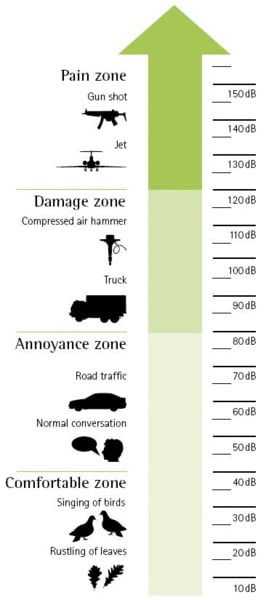Does Loud Noise Cause Hearing Loss?
Exposure to excessive levels of noise can cause temporary or permanent hearing loss.
As the busiest and longest established audiology clinic in the region HAB Hearing highly recommend avoiding situations of excessive noise, or if unavoidable to wear ear protection whilst in the presence of loud noise.
We can provide custom (personally fitted) ear protection for clients working around excessive industrial noise, shooting plugs for game and clay shooting, swim plugs if you are prone to ear infections when swimming, musicians ear plugs, and even sleep plugs if your partner is a loud snorer!

For many years there has been strong legislation in place to protect workers against industrial noise, and often disposable plugs do not offer great protection, particularly if inserted incorrectly. Custom plugs offer greater protection and actually in the long run work out cheaper than disposable ear protection over a number of years.
Hearing Loss and Loud Noise
Hearing loss is a decrease in your ability to hear or understand speech and sounds around you. Hearing loss can happen when any part of the ear or the nerves that carry information on sounds to your brain do not work in the usual way.
In some cases, hearing loss can be temporary. However, it can become permanent when vital parts of the ear have been damaged beyond repair. Damage to any part of the ear can lead to hearing loss.
Loud noise is particularly harmful to the inner ear (cochlea). A one-time exposure to extreme loud sound or alternatively listening to loud sounds for a long time can cause hearing loss.
Loud noise can damage cells and membranes in the cochlea. Listening to loud noise for a long time can overwork hair cells in the ear, which can cause these cells to die. The hearing loss progresses as long as the exposure continues.
Harmful effects might continue even after noise exposure has stopped. Damage to the cochlear is generally permanent.
Damaged Hair Cells in Your Ears Can Lead to Hearing Loss
 The average person is born with about 16,000 hair cells within their cochlea. These cells allow your brain to detect sounds. Up to 30% to 50% of hair cells can be damaged or destroyed before changes in your hearing can be measured by a hearing test. By the time you notice hearing loss, many hair cells have been destroyed and cannot be repaired.
The average person is born with about 16,000 hair cells within their cochlea. These cells allow your brain to detect sounds. Up to 30% to 50% of hair cells can be damaged or destroyed before changes in your hearing can be measured by a hearing test. By the time you notice hearing loss, many hair cells have been destroyed and cannot be repaired.
After leaving a very loud event, such as a concert or football game, you may notice that you don’t hear as well as before. You might not hear whispers, sound might seem muffled, or you may hear ringing in your ears. Normal hearing usually returns within a few hours to a few days. This is because the hair cells, similar to blades of grass, will bend more if the sound is louder. But they will become straight again after a recovery period.
However, if loud noise damaged too many of the hair cells, some of them will die. Repeated exposures to loud noises will over time destroy many hair cells. This can gradually reduce your ability to understand speech in noisy places. Eventually, if hearing loss continues, it can become hard to understand speech even in quieter places.
Noise Can Also Damage Nerves in Your Ears
In addition to damaging hair cells, noise can also damage the auditory nerve that carries information about sounds to your brain. Early damage may not show up on your hearing test. It can create a ‘hidden hearing loss’ that may make it difficult for you to understand speech in noisy places.
The effect of loud noise over time affects how well you might hear later in life. It also affects how quickly you might develop hearing problems, even after exposure has stopped.
Protect Your Hearing Now
It’s very important to take exposure to excessive noise seriously and it’s much better and more cost effective in the long run to protect your hearing right now than suffer the consequences down the line and after the horse has already bolted out of the stable door!
For a selection of the ear protection we supply please click this link
